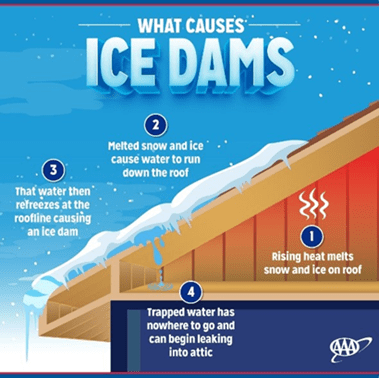Icicles hanging from the roof may seem like a typical part of winter in the Gem State, but they can also be signs of an ice dam that can cause expensive damage to your home.
Ice dams form when warm air from inside your home leaks out to melt snow on the roof, causing water to run down to the gutter system, where it can refreeze and create a blockage at the roofline. As the cycle of melting and freezing continues, water can eventually pool behind the ice dam – and with nowhere to go, it may force its way under the shingles and back into your home.

AAA offers the following tips to reduce the chances of an ice dam forming:
- Make sure your home is properly insulated, and that vents are not blocked.
- Increase attic ventilation to help circulate air and maintain a consistent – and possibly lower – temperature.
- Prevent heat from escaping into the attic by ensuring all attic ducts are sealed and properly insulated. Exhaust fans should lead outdoors, not to the attic.
- Consult a professional if your attic is a living space, as you may need additional vents or insulation added.
“Keeping the bottom couple of feet of roof and gutters clear of snow can further reduce the risk of ice dams, but it’s not a guarantee,” says AAA Idaho public affairs director Matthew Conde. “If you do find yourself dealing with a major ice dam or a heavy snow load, call a professional with experience in safely removing it. Ask about their methods for doing so, as chipping or sawing away at the ice can cause shingle or gutter damage.” AAA reminds homeowners that many insurance policies offer protection against water damage or leaks, but it’s important to check your policy to make sure you’re adequately covered. Address any concerns with your insurance agent.

